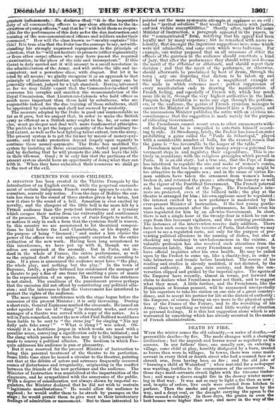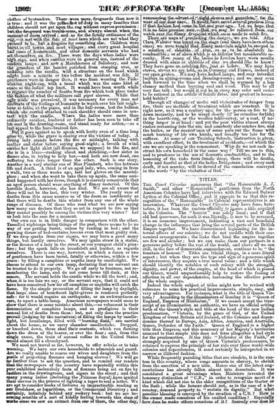DEATH BY FIRE.
Wrrn the winter comes the old calamity,—a series of deaths,—of preventible deaths—by fire. The mode changes with a changing civilization ; but the anguish and horror recur as regularly as the seasons. In our fathers' time, one usually saw, on entering a village, some child at play, horribly disfigured by a burn, treated as burns then were in villages. In towns, there was some maid- servant in every third or fourth street who had a seamed face or a shrunk arm, from having been on are; and the old joke of "burning a child at Waterford " ; when material for a newspaper was wanting, testifies to the commonness of the occurrence. In those days maid-servants struck lights with the tiresome tinder- box ; and many a sleeve caught fire in the drowsy winter morn- ing in that way. It was not so easy to light a fire then as flow; and, in spite of orders, live coals were carried from kitchen to parlour. Then the smoke and gas confused the bearer by the way, and a dropt coal, or the draught carrying the apron to the flame caused a calamity. In those days, the grates in even the best houses were higher than now, and more in the way of the clothes of bystanders. The ,Nrere morerfireguards than now it is true: and it was the prifam**.i3ft duty in many families that children should not get upon, the rug without express permission : batlitherdre voyktrculieseate,. and; always, absent, when, the nioxamtlof ;a n& as for.the.faraily.ordiraince of the of Must laws which are not what they Tst something else. Children were 1134 ies;_ and 0/ay .great hospital haa- eiSes er domestic servants Who had
. r
set theme ',pp_ .,r,. !,e,werc the days when ladies 'non, high caps, .and when c ef!.wire in general Use, instead Of the niedern : and no* ,a .14a-chimes& of Salisbury, and Ow. the iffindain Ale hamlet perished. from stooping over, or n into the candle, with".a: striniture on the head which might urn a minute or two before the accident was felt. If gentieren-7m!ip. danger then, it Was from wearing the Pick- wicklaiOislitce..th a tassel Which was the same kind snareasilin:10es top Istiot. It wcaild have been worth while to tfrUe number of 'deaths from fire which took place tinder, We_ What the milliners call gigot sleeves. While that, Ugi, .,..rovfas prevalent, it was necessary for every Man net. aOuvqtr-Atwiedipfe:9piiiii,ity toWatehoyer his felt neigh- boar Ile, -at the pone; and in the ball-room, lest the balloon, wiiiCh she carried etfeeleed teleadi An:inkier should cam in -aon- taell...• with the Candle. Where the, ladies were more than- ordinarily careless, husband or father has been seen to take off, his coat in the drawing-room, and stani ready for action,—as a' knit appeal to the hare-brained fair. 13Ift it goes ;against us to speakwith levity ;even of a time long gette-by, WERetliii grave is Closing over the victims of today. A yeteig lady stands before the fire at midnight, 1 talking with mother and slater- before saving gbod.-night; a breath of wind. carries her light skirt (alifrounoes, we suppose) to the. fire, arid, she is in a blaze—rushing about arid shiseking,-,--her sister in flames also, in trying to -kelp her,—and beth are now dead„ one suffering ten days longer than the other. Such is one story.: Another is a very similar one of Miss Plunkett, who betifelaii life and death. .A. third is of an aged lady, who, coming in from a Walk, two or three weeks ago, laid her gloves -on the mantel, piece ; and when she went to take them up again, the same acci- dent happened with her dress, though itisscarcely conceivable that an aged person should wear anything of flimsy materiaL Of this horrible Ileath,. lieweier, she has died. We are all aware that these will not be the last, this very winter. The yearly snm of deaths from this cause assures us of the doom. as confidently as that there will be deaths this winter from any one pf the Whole range of diseases. Of those who read. what we are now spying bieWmany can declare that they so act in regard to fire as that they cannot possibly be among the victims this very winter ? Let n ook into the-case for a moment.
Our own sex is in little danger in comparison with the other. Tateielled nightcaps being things of the past, there seems to be no Way of our getting burnt, unless by reading in bed ; and the growing disuse of bed-curtains lessens even that most guilty risk. If we drop sparks from our cigars, we may burn a good Many things' but hardly ourselves. We may ignite straw in a stable,, or the- flounce of a lady in the street, or our youngest child's pina- fore; but the spark falls on broadcloth and leather, as regardseuiselves. There is one way, however, in which a dozen or two of gentlemen have been burnt, fatally or otherwise, within a few years: by filling a camphine or naptha lamp by candlelight. We choose to attend to our own lamp, declaring that no servant can be trusted to do it properly. We go off early to business, not re- membering the. lamp, and do not come home till dark, at this season. The servant holds the candle while we fill the bowl; and, when it is too late we say, or the servant says that it could not have been conceived how far off eamphine or naphtha will catch the flame. By the simple precaution of filling the lamp by daylight, that large class of beneficent light-givers is rendered perfectly safe : for it would require an earthquake, or an awkwardness as rare, to upset a table-lamp. American newspapers would. seem to show that there is some mistake about this,—so vehement is their denunciation of caraphine lamps, and so prodigious is their annual list of deaths from them: but, not only does the practice -(judging.by thonarratives). of falling the lamps by curdle-. ht, but handlamps, filled with "burning fluid," are carried About the house, as we carry chamber candlesticks. Dropped, or knocked down, these shed their contents, which run flaming *len the dress of the bearer, or over the floor; and, from this mingle cause, the train of annual coffins in the United States amid almost fill a churchyard. • We used not travel so far, however, to offer rebuke or to take warning. We have our own households to admonish and guard. itre we really unable to rescue oni wives and daughters from the perils of projecting flounces and hanging sleeves ? We will go sin further than to ask the question, and to remind our readers that the newspapers of the country have repeatedly within this year exhibited melancholy facts of flounces being set on fire by lucifers in the drawingroorn and cigars in the street ; and that manyyoungsg ladies (incluiling the :Princess Royal) have -ignited their sleeves in the process of lighting a taper to seal e letter. We are apt to consider books of fashions as impracticable 'reading as cur Bradshaw, or logarithm, or the Commercial Directory ; and Certainly, infinitely behind . any eookery book but we are be- coming sensible of a sort of kindly feeling towards this class of works sinoe we saw an extract from one of them, the other day, iidmpg Wt., fur the .41.:-Wedietr.91i.1)* .14$!4Yes it Le.fecTwejhat it/4bn* Aranyaq nqiy, heftlig14.9.APA:,4 41-APP4R4I; te 14 Tii4 at9*Artq:c.jul TJicaLPtr.:9 FAA-0-tvrfrAF rt, -40fer C.iFqeiW Otter -151fi tiVge -OA* Oh* 81W9 @[ blk9104fIliANgikYA,P4e9P4, a V9 uogi 006140, ii.4914t4ly :4- • eurity„ . ow „inany qf .* 1414 ete* on.heve worm .
coniltuati k dreaei.
T4CY. lairfe4.04'PARRil Ii4k44-1119.i.; 4,1,4 ;474 Ii4e. We may. use
a in
,and France, stea of st9708,1!APv2442P3 ES, i
014,413911;gr4e?eq...AR241,4. nips„ and may interdict
keit agar mg-zooms ;)oncl-
we- may . Oren
look forward to the' time when we Aiall ivarmed by a less clumsy method than burning coal and wood. This may be all very fine tall- • but win4 in every way safer and easier to be rational in the article of foible dress,' 'and prudent in honk- holdhlibits ?. • Throngh all changes of tiled& . and vicissitudes: of -danger from fire, 'there areinethols ofilfent;i4nt Which are !C•tillialitift. tight ad*, asitwus iieerittuVared; for the persen.en tre to' lie down inStatiflye and. f,,thOr ,kirtipt dloselv. (if no crincilineforbids) in the-hearth-rug, or the Woollen table-cover, or' a heat, if' thing larger Is at hand : and yetthe poor victim aimed always rushed sereaniingliztAvihe air, and somebody else catches fire,,Antl. the littler, or the ileafestman of Sense puts Out the' flame :With much burning of his Own hands, and tsiially too late for 'die: safferet. At Some of MIT Training Schools, ': instruction, is given,. with excellent effect, in the treatrizent of accidents,--of which the one wenienpeaking-is the commonest. Why do we not. eaell: in- struct the ...same- may ? Till We see to thie,' and to prudeneeiutlifiliiiertifriloriledtic combustibles, and hi the lessening Of the risks fret& feincle,"dresS, -there 'wil be denths; early nail- fearful as that of the ladies .13ridge4inin ,• and' estery such death, -Hindi murder, -will be-devoid of the consolation conveyed in the words by the visitation: of God." -•



























 Previous page
Previous page